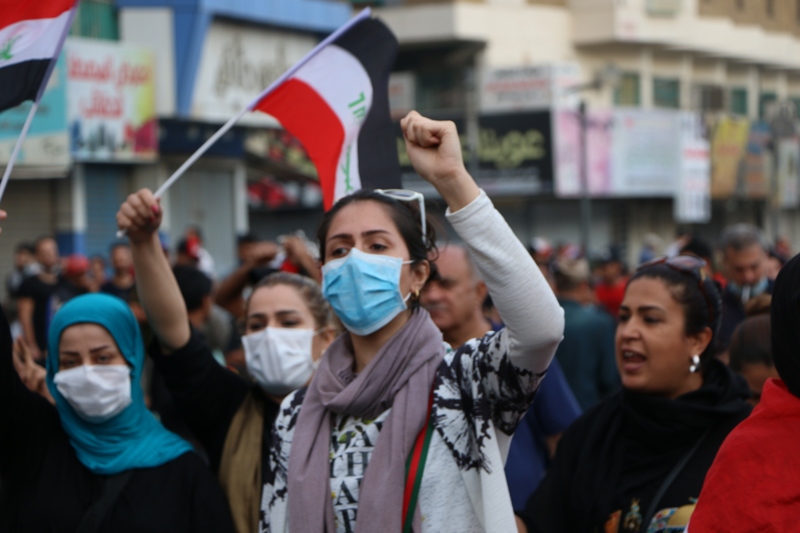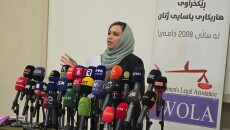Social media platforms in Iraq are being used as a silent weapon against women through cyberviolence and the dissemination of hate speech, which to some extent affects women and their presence on online platforms.
In the space of cyberviolence, feminist activists and those working in politics become the primary victims, in addition to women who work alongside men and run independent businesses.
The damage caused by cyberviolence is no less severe than the physical violence women experience in real life through defamation, abuse, hate speech, and revenge porn.
The most dangerous of all, facilitated by technology, is the barrage of insulting and destructive comments, offensive posts, and fabricated photos and videos. The most destructive step is the creation of fake social media accounts in their names, which publish fabricated photos and articles that further fuel the attacks they face on social media.
According to statistics from the United Nations UN Women Committee, 21% of women in Iraq have been subjected to cyberviolence, 43% of them more than once and in various ways, while 31 percent of men did not hide their perpetration of this type of violence.
A living example
At the end of last August, the community police in Kirkuk intervened in a cyber-violence case after a young woman running a self-employed business filed a complaint via the hotline.
The details of the case related to cyber blackmail perpetrated by a young man through his online account. He targeted a young woman's Facebook account, which she used to promote products for the shop she ran in the market.
Intisar Karim, director of the Women's Empowerment Division at the Kirkuk Province Office, told KirkukNow, "The young man was constantly blackmailing her electronically and wanted to force her to quit her job and close her shop."
The lady called the police via the emergency hotline (911) asking for help. "She was subjected to a lot of electronic blackmail. She was upset and exhausted and had no other solution," according to Intisar.
Intisar noted that the community police addressed the problem without explaining how it was resolved. However, she emphasized that "the girl is currently practicing her work freely and without fear."
She added, "Many serious blackmail cases occur, and the community police handle them. However, if the police learn that the problem is serious and unsolvable, they refer the case directly to the court."

According to a UN study, cyberviolence takes many forms, including hacking, the use of technology to monitor someone's activities and actions, including monitoring women's workplaces and attitudes through technology, as well as the use of cameras and communication applications to steal email passwords, copy messages and communications, and publish fabricated photos and videos without their consent.
Last year, Turkmen political figure and former secretary to the Speaker of the Iraqi Kurdistan Parliament, Muna Kahveci, was subjected to a torrent of abuse and defamation on online platforms.
The wave of abuse began after protests led by Kahveci against a series of decisions issued by the Federal Court on February 24, 2024, regarding the Kurdistan Parliament's election law, which included reducing the number of minority quota seats in Iraqi Kurdistan Region IKR from 11 to five.
The abuse escalated over the course of a week, with photos and videos of Muna Kahveci going viral on social media.
A video of Mona Kahwaji's press conference, published on February 25, 2024, to mark Turkmen Press Day, garnered 7,600 comments, nearly 7,000 of which included sarcasm and insults, most of which included the phrase "Back to Kitchen," as well as 6,100 laughing emojis.
"I am defending the Turkmen component," Kahwaji said, emphasizing that the cyber bullying and attacks she has faced on social media will not deter her from her mission.
A UN study published in March 2024 showed that women worldwide are 27 times more likely to experience cyberviolence or hate speech than men, despite being 20% less likely to use the internet.
Cyber Violence Goes Unnoticed
In the IKR, which comprises four of Iraq's 19 provinces, only 226 women filed complaints regarding cyberviolence in 2024. This number, according to local women's rights organizations, is significantly lower than the actual number of cases of violence against women.
According to statistics published by the Women's Legal Assistance Organization (WOLA) last June, 70 women filed complaints against posting their private photos and videos on social media without their consent. According to the statistics, 57 women complained of being threatened with the publication of their private photos and videos, often to force them to pay money or submit to men's sexual desires.
Gona Majeed, a member of WOLA, which employs volunteer lawyers to defend women who have experienced all forms of violence, expressed concern that many arrest warrants issued in the context of domestic violence are not implemented, which may be a reason for women's reluctance to file complaints. For example, in 2024, out of a total of 2,093 arrest warrants issued for individuals involved in all forms of violence against women (physical and electronic), only 235 were arrested.
Another poll published this year showed that 21% percent of women choose to remain silent when they are abused, while 55% of them file complaints.
39% of women believe that relevant authorities are not contributing to resolving the problems of women facing violence, including cyberviolence. Therefore, 64% of women are calling for the establishment of a special court for these cases.
However, according to a UN Women report, 41% of women and 36% of men across Iraq believe that the best way to address cyberviolence is through police intervention.
27% of women also believe that the government should improve its policies related to online platforms as a good means of combating gender-based cyberviolence.
Punishments and Local Initiatives to Combat Cyber Violence
Calls are rising in Iraqi society to encourage women to stand up to violence and not allow these cases to go unpunished. This is seen as a strong front against perpetrators of cyber bullying, especially since the law strongly supports this.
According to the Iraqi Penal Code, which the Judicial Council has called for amending and implementing, sexual assault in all its forms is a crime punishable by up to one year in prison and a fine. The IKR has its own law to address cases of cyberviolence, which prohibits the misuse of mobile phones.
According to Article 2 of the law currently in effect in the IKR, "Anyone who misuses a telephone, mobile phone, any wired or wireless communication device, the internet, or email with the intent to threaten, accuse, spread false news, or commit dishonorable acts shall be punished by imprisonment for a period of no less than six months and no more than five years, and by a fine of no less than one million (Iraqi) dinars (USD700) and no more than five million dinars."
The head of the Women's Empowerment Department at the Kirkuk Governorate Diwan, says, "Community police in Iraq are of great importance in supporting women who are subjected to cyberviolence, and women can turn to them without hesitation," she added. "I assure you that all your cases will be kept confidential and confidential."
"Cases of violence have increased significantly, especially against girls under the age of eighteen, who may succumb to cyberviolence for fear of the reactions of their relatives and community."
The current Iraqi government, headed by Mohammed Shia al-Sudani, has provided a central emergency line (911) for all Iraqi provinces, which women and all victims of violence and cyberbullying can call.
The Kirkuk administration has also allocated a hotline (497) for girls who are subjected to violence and threats.
In the IKR, a hotline (119) is available to report cases of violence.
The community police, which the Iraqi government relies on in such cases, are staffed by women, enabling women to communicate without fear when they are subjected to violence.
An official in the community police affiliated with the Ministry of Interior said, "Our hotlines are available free of charge. Our statistics on cyberviolence and cyberbullying are shocking, so we constantly hold seminars and launch public awareness campaigns, encouraging women not to remain silent, as the government is determined to combat perpetrators of violence."
42% of women in the IKR suggest raising legal and social awareness to combat cyberbullying, while 28 percent believe that mosques and religious leaders can play a role in Iraqi society.
Majeed, from the Women's Legal Assistance Organization, believes that enacting a law criminalizing the misuse of mobile phones and communication devices in colleges, and building good relationships between the Ministries of Interior, Education, Higher Education, Health, and Endowments, are important factors in reducing violence in all its forms.
She also pointed to the importance of strengthening the role of the media in raising awareness and increasing the number of female investigators in offices, directorates, and centers dedicated to combating violence.
Laila Ahmed contributed to the preparation of this article.






